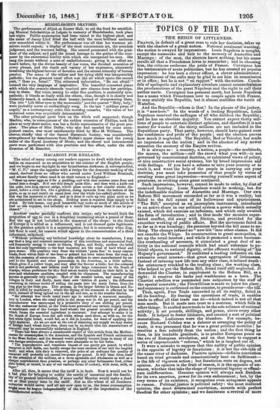MACARONI FOR ENGLAND.
The mind of many among our readers appears to dwell with fond expec- tation on macaroni as an acquisition to the cuisine of the English people; and we begin to see daylight in our hyperborean darkness. A correspondent, " W. C. P.," stops the appetite with a recipe fur the domestic making of the viand, derived from an officer who served under Lord William Bentinok, and whose family often used it on their return to England-
" Beat up some eggs as if for a pudding, and with that moisten some flour and knead into a dough. Roll out this dough. quite thin; and then with a knife cut the cake into long narrow strips, which place across a few slender sticks dis- posed, before a clear fire, like a gridiron, rising upwards from the bottom of the grate, so as to cast nearly an equal heat over the whole (so-called) gridiron. In this way the macaroni is dried; and as it dries it curls up into pipes such as we are accustomed to see in the shops. Nothing more is required than simply to be dried. By this means, any good housewife may make as much of this article of food as she requires, and certainly at a much less expense than it can be pur- chased."
Another reader partially confirms this recipe; only he. would limit the proportion of egg to one in a doughboy containing about a pound orflour. But the egg is not included in the macaroni of the shops: in the South of Europe it is added as a refinement, and is not deemed quite legitimate. In the genuine article it is a supererogation; but it is necessary when Eng- lish flour is used, for reasons which appear in the communication of, a third informant, subjoined.
" Without professing any technical knowledge about its manufacture, I may say that a long and constant consumption of this nutritious and economical food, and frequently seeing it made in Genoa, Naples, and Sicily, confirm the belief that the only ingredients in the best macaroni are the meal of hard wheat and pure water. The qualities vary from the whitest ' pasta fine' to many coarser kinds, from which little of the bran or pollard has been taken from the meal, to suit the economy of consumers. The only addition to some manufactured for ex- port to the Spanish and other possessions in the Americas, is a little saffron; which gives it a yellow tinge, and may alter the flavour a little; but the coloured sort is not preferred, and seldom used by the large consumers in the South of Europe, whose preference for this food seems mainly founded on their faith in its pure and wholesome qualities, coupled with its cheapness. The manufacturing process is generally very simple. Most of the smaller towns, and many of the villages in Italy and Sicily, have their own fabrica di pasta '; the difference consisting in various modes of rolling the paste into the many forms, from the long pipe to the little pea. This process, in the larger fabrics in Genoa and Na- ples, is aided by machinery; where the drying of the macaroni is effected by the stove, instead of being spread out in the air and sun, as in the smaller fabrics. "An attempt was made many years ago to establish a macaroni manufac- tory in London, when the retail price in the shops was 2s. 6d. per pound, and the manufacturer was encouraged by a protective duty of one shilling per pound. But the endeavour failed, as the Corn-laws prevented any certain supply except at exorbitant cost of the foreign hard wheat; the greater quantity of gluten in which forms the essential ingredient in macaroni. Any attempt to make it in the South of Europe from the soft white wheat used there, as with us, for the best white light bread, would fail, as it did in Loudon, for want of applying the right material. As we are now on the eve of obtaining any supply we may desire of foreign hard wheat duty-free, there can be no doubt that the manufacture of macaroni may be successfully undertaken in England.
" There has been always a considerable export of this article from the Mediter- ranean for consumption in the Americas, and the Spanish and French settlements in the West Indies; and the demand would probably become large in many of our own foreign settlements, if the article were attainable at its fair value.
" The unproductive and vexatious impost of one pennyper pound, to which macaroni is still liable, can hardly escape the next revision of our still too lengthy tariff; and when this duty is removed, the price of an ordinary fair quality of macaroni will probably not exceed twopence per pound. It will then force itself on the attention of the millions, as a more agreeable and wholesome as well as a cheaper nourishment than potatoes, or perhaps any other farinaceous food, either Plain boiled, or mixed, in any of our various forms of cookery, with meat, milk, or sugar."
After all, then, it seems that the tariff is in fault. Now it would not be It bad plan for bringing to notice the merits of macaroni and the feasibi- lity of its general introduction, if some useful Member would make a dead set at that penny item in the tariff. But as the wheat of all Southern Countries would serve, and all are now open to us, the home consumption alight soon be begun independently of the tariff or the importation of the manufactured article.


























 Previous page
Previous page